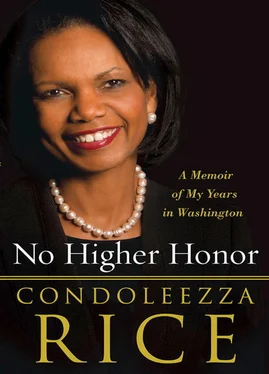Because of a very capable career administrative staff that works for the executive secretary, there is a kind of bureaucratic continuity. This allows for smoother functioning on the national security side of the White House than on the domestic side, which has essentially no standing career apparatus. When I returned to Washington, I was struck by the degree to which the paperwork looked exactly as it had when I had left as special assistant for Soviet affairs on the NSC staff of George H. W. Bush in 1991.
Given the prominence today of the national security advisor, it is surprising that the role, officially known as the assistant to the President for national security affairs, is not even mentioned in the 1947 legislation. McGeorge Bundy, who served President John F. Kennedy, is widely regarded as the first person to hold the position. Since then, there have been many variations in how the role is played. Some, such as Henry Kissinger, have sought—successfully—to become independent power centers. Others, such as Brent Scowcroft, have been honest brokers in representing the views of the secretaries to the President but giving him advice privately, never publicly.
The national security advisor is staff—rarified staff, to be sure, but staff nonetheless. There’s no doubt that sitting a few feet from the Oval Office confers influence, but it is the reflected influence of the President and must be used sparingly. The national security advisor must find a way to get the secretaries to do what the President wants them to do. I once told the President that this was a bit like trying to execute policy with a remote control. You don’t own troops, diplomats, or a budget. You have only your relationship with the President. I felt confident in mine and was sure that I knew what kind of NSC I would run.
We are all captives of our earlier experiences, and mine had been a very good and successful one when I had worked for Brent Scowcroft. I patterned my role after Brent, as an honest broker, not a separate power center. There would be a small staff, dedicated to doing the work that the Cabinet departments could not but avoiding the tendency of the NSC staff to duplicate their efforts. And never would the NSC become involved in operational matters. The execution of policy was to be left to the Cabinet secretaries, who carried the authority that Senate confirmation conferred. The NSC staff, on the other hand, cannot be held accountable by Congress because it is part of the President’s personal staff. It is too small and too close to the President to actually act on behalf of the United States.
The imperative that secretaries (and their departments) handle operational matters was a conviction shared by everyone who’d studied the disasters that had befallen presidents when the NSC tried to be something more than a coordinating body. The most recent example had been the Iran-Contra affair, when the NSC staff had taken it upon itself to devise and then carry out a policy widely viewed as risky at best and likely illegal. As the facts emerged, it was clear that the plan to divert funds from covert Iranian arms sales to the Nicaraguan resistance (the Contras) had been cooked up secretly within the NSC staff—apparently without the knowledge of the secretary of state, let alone Congress. The fallout was disastrous; the affair almost brought down the Reagan presidency.
The counsel to the Tower Commission, which was chaired by former Texas Senator John Tower and investigated the affair on behalf of President Reagan, was none other than Steve Hadley, now the deputy national security advisor. He and I vowed that the NSC staff would play a limited but effective role, carrying out the agenda of the President through, not around, the Cabinet secretaries whom he’d appointed. As for my role in particular, I intended to keep a low public profile.
But if the NSC is to be an honest broker, it helps enormously to have Cabinet secretaries who work well together. The NSC should intervene when there is a policy disagreement among the departments or when they cannot coordinate among themselves. But the NSC cannot do so on every single issue every day, or the system would grind to a halt, wallowing in inefficiency. Most of the time the Department of Defense and the State Department need to find a way to work together—at all levels.
To be sure, tensions between Defense and State are almost endemic, and there have been some cases—Caspar Weinberger and George Shultz come to mind—where the two principals barely spoke to each other. That is not, as some might think, because State is from Venus and Defense from Mars. In fact, there are many times when the secretary of state is more willing to use force than the Pentagon, given the admirable conservatism of professional officers about the use of military power.
Nonetheless, secretaries of state find the Pentagon all too willing to exert influence in foreign policy. With a budget nearly forty times that of the State Department, the Defense Department possesses an awe-inspiring logistical capacity, and State sometimes finds itself dependent on and resentful of the military’s reach. No U.S. response to a humanitarian crisis, such as the 2004 earthquake in Indonesia, is possible without the extraordinary capabilities of the Pentagon. The military undertakes humanitarian work around the world through, for example, the USNS Mercy hospital ship. In the best of circumstances, those capabilities merge seamlessly with the diplomatic expertise of the ambassador and his embassy, producing a unified U.S. response to a crisis or opportunity.
But that’s not always the case. Combatant commanders exist for each region of the world, and they sometimes act quite independently, developing their own relationships with foreign leaders and bringing their influence to bear on issues that at best cross and at worst shatter the lines between diplomacy and security policy. Those commanders have enormous assets. For example, the commander in the Pacific (USPACOM) lives in Hawaii and travels on dedicated military aircraft across the Pacific and in Asia. By contrast, the assistant secretary of state for East Asian and Pacific affairs will often find himself in a web of connecting commercial flights that can take more than twenty-four hours to deliver him to the region.
There is also, of course, the tendency of civilians in the Office of the Secretary of Defense to have many different opinions about how diplomacy ought to be carried out. State Department officials must politely remind them that getting other countries to do what you want is no easy task. It is State that must deliver, but everyone has views about how to get it done, and often those individuals are vocally critical of how State is doing its work. It isn’t surprising that the relationship between the two departments is sometimes a bit tense.
In the case of Colin Powell and Don Rumsfeld, it went beyond such almost inescapable tensions. The two men had known each other for years, and there was a good deal of personal respect. There was an equal measure of distrust, however. The two did not confront each other face-to-face, let alone in front of the President. Rather, Don would send memos (snowflakes, we called them) that implicitly—and sometimes explicitly—criticized what State or the NSC was doing. Often those memos reflected discussions that had already taken place, but they left the impression that it was Don imparting new wisdom or making an important recommendation. In meetings, he would ask Socratic questions rather than take a position. This led to tensions with and frustrations for Colin.
In addition, Colin had to battle the perception that State was not always on the same page with the White House. There is a tendency of Foreign Service officers to regard the President and his political advisors as a passing phenomenon without the deep expertise that they, the professionals, bring to diplomacy. That sometimes led State to tell the world “What the President meant to say,” usually in some leak to the Washington Post or the New York Times . The inclination of some in State to display what they regard as their superior expertise was especially strong in the first turbulent years of the Bush administration, but former Secretary of State Dean Acheson had talked about the appearance of the phenomenon decades before. As Acheson put it in his memoir Present at the Creation , “The attitude that presidents and secretaries may come and go but the Department goes on forever has led many presidents to distrust and dislike the Department of State.”
Читать дальше












